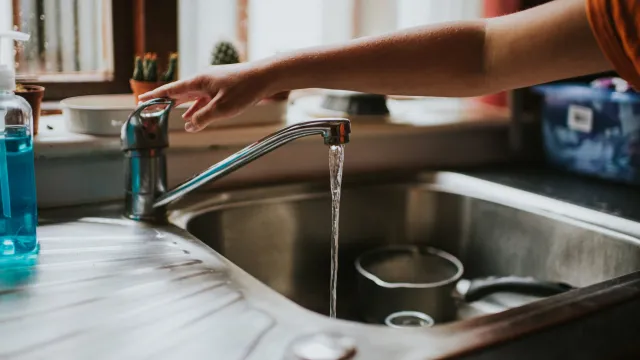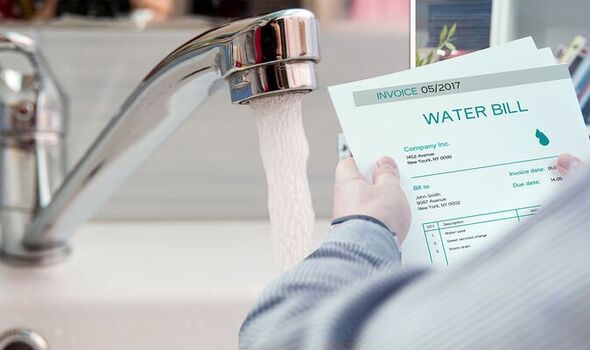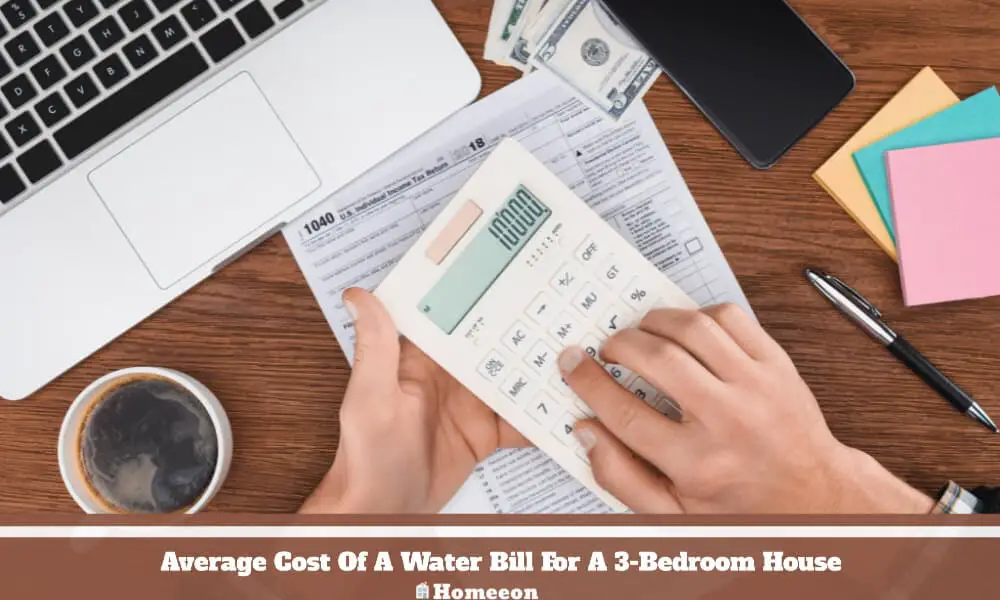Last Updated on July 27, 2023 By Emma W. Thomas
The average cost of a water bill for a 3-bedroom house varies depending on location, water usage, and local utility rates. However, it can range from $30 to $70 per month in the United States. Factors like water conservation efforts and household size can affect the actual amount.
Average monthly water prices in the U.S. by state
| Name of the State | Average Cost |
| West Virginia Oregon Alaska Washington California Wyoming New Jersey Hawaii Arizona Nevada Maryland Idaho Delaware Texas North Dakota Missouri Utah Colorado Connecticut Montana Oklahoma Virginia Tennessee Mississippi Louisiana Florida New Mexico Iowa Rhode Island Massachusetts Nebraska Kentucky South Carolina Pennsylvania Kansas Indiana New York Minnesota Michigan New Hampshire Georgia Ohio Illinois South Dakota Alabama Arkansas Maine Vermont Wisconsin North Carolina | $105 $88 $87 $78 $76 $74 $71 $64 $53 $50 $50 $49 $48 $45 $42 $42 $41 $41 $41 $41 $39 $36 $36 $35 $34 $34 $33 $33 $33 $33 $32 $31 $31 $31 $31 $31 $30 $30 $29 $28 $28 $28 $26 $26 $24 $24 $22 $21 $21 $20 |
How Do Water Billing Rates Compare Between New York And Other States?

Below are tables showing water bill rates in different states;
States With The Most Expensive Water Prices.
| State | Water prices (per month) |
| West Virginia | $72 |
| Connecticut | $69 |
| California | $65 |
| New Jersey | $64 |
States With The Least Expensive Prices.
| State | Water prices (per month) |
| Florida | $6 |
| Wisconsin | $18 |
| Vermont | $18 |
| Maine | $19 |
How Do You Calculate The Average Water Bill?
Most water companies calculate water charges in two ways. The first method they use is the unmetered way to calculate a pre-set rate that is decided upon by the rateable values of your home. These rates are set depending on how you spend water in your home.
Another way of determining water bills is by using a metered method where a home is billed for the water they use the same way electricity bills are generated. However, if you are using the unmetered method and your water bill happens to be high, you can opt for the metered one, and your supplier will change that for you.
Usually, in the case of the unmetered water billing method, your water usage may not be in any way related to the bill. It is usually the case as you do not have a water meter for your home. For this reason, your water bill will always be a fixed charge based on your ratable home value. Most rateable values used currently are based on the local authority assessment on rental value, which is frustrating as the ratings used were set between 1973-1990. Information on these ratings is hardly updated, and appealing to these values is almost impossible.
On the other hand, a metered bill is made up of fixed charges which are volumetric. They tend to cover your exact water usage, and charges will depend on the amount of water you use. It is better to ask your water providers to use a metered bill to determine the amount of water you are using. It shouldn’t worry you if you want to switch to the unmetered one since the installation of water meters is not a permanent fix.
What Causes High Water Bills In A Home?
Water is considered a major utility in any city, making it a significant concern to most renters, homeowners, and commercial property owners. A high water bill is usually due to this precious commodity going to waste somewhere in a household. A study by EPA showed that leaks could account for over 10 000 gallons of wastewater per year as some homes leak over 90 gallons of water in a day. When you receive a high water bill, you should track down the cause and treat it as soon as possible. Some of the reasons for higher water bills in your home include;
Leaking Toilets
Toilet water accounts for about 30% of the total cost of water used in a household for the average American homeowner. It should be a surprise since those small and tiny drops from leaking toilets can pose a major water loss risk. A running and leaking toilet can waste up to 6,000 gallons of water per month, translating to hundreds of dollars on water bills. You can use the two most common methods of checking up on any possible toilet leaks, which include;
The Soundcheck
You walk up to the toilet and listen. If there are odd hiss-like noises, your toilet may have leaks, and you should have the tank flipper, water line connections, and seals checked.
The Dye Test
In this method, you use some food coloring or a dye tablet. You put the dye tablet or food color in the tank and wait for a few minutes before checking whether there are any dye traces in the toilet bowl. If the dye or food color is present, then a leak is present, and you need to repair it. Usually, leaks are caused by a faulty flapper in the toilet tank, and it is relatively easy to fix.
Leaky Faucets And Fixtures
Leaky fixtures and faucets are another common cause of high water bills in your home. A heavy leak translates to more water getting wasted hence a higher water bill. For instance, a faucet leaking one drip per second can waste about 17 gallons in one day. The good thing is that a leaking faucet is easy to spot and fix. To avoid unnoticed faucet and fixture leaks, you should always check on the showerheads and other fixtures to help you identify any possible leak out. A faulty rubber washer causes most faucet leaks in the handle, easily be replaced with a new one.
Changes In Water Use Patterns Within Your Household
A small change in water usage in your home can cause a big impact on your water bill. Water change patterns may be due to varying seasons or an increase in the number of people in your home. The best way to prevent a sharp hike on your water bill is to plan before any changes where possible. Sometimes you will have to budget for a higher water bill for certain months due to high consumption or as long as you have additional family members.
Having Water-Wasting Habits
Sometimes, a substantial-high water bill can be due to overconsumption behaviors connected to the type of appliances you have in your home. Some of these behaviors include;
1. Using top-loading laundry and washing machines is known to consume more water than the modern front-loading laundry machine. A top-loading laundry machine consumes as much as 200% much more than the front loading one.
2. Using washing machines for half and quarter loads instead of waiting for a full load. Many quarters and a half loads will translate to more water and electricity being used. Instead, you can wait to get a full load and do the laundry at once.
3. Overwatering the lawns and other unmediated water-consuming recreation equipment such as mini-swimming pools.
4. Lengthy shower periods with continuous water flow. You should try and spend less than five minutes in the shower, which could save you up to 1,000 gallons of water a month.
5. Handwashing dishes with running water. Washing dishes with running water can consume 4-5 times more than when using a dishwasher.
6. Unnecessary water flows such as shaving or brushing your teeth lead to water wastage which translates to higher water bills.
Limiting such wasteful behaviors can help significantly reduce your water bills by enhancing efficiency in water usage.
What Can You Do To Avoid High Water Bills?

You can work on some things to ensure your water bill does not go so much high. The following are some of the things that can help keep your water bill lower;
Check And Treat Possible Leaks
Leaks can waste many gallons of water no matter how small the drops from the leaks are. They should be acted on immediately you notice one. You should also check out possible leaks from toilets, faucets, outside taps, showerheads, and other possible water-leaking parts. Carrying out routine checks on these places can help save on water bills. You should also have a professional check on outdoor and underground water pipes, which could also have leaks. They are worse since they are difficult to spot, unlike indoor leaks, which can sometimes be very obvious.
Avoid Using Too Many Water Softeners
Households that use water softeners have higher water bills since their washing is involved with many regeneration and backwash cycles. The more the washing cycles and water discharge, the more the water is being used, translating to a high water bill.
Reprogramming Of The Irrigation Systems
Irrigation systems are a common source of high water use, especially during summer. Automated irrigation systems should be regularly checked and reprogrammed such that they use less water during the rainy season to avoid unnecessary water use. You need to check the sprinkler heads regularly to avoid leaks or too much water let out.
Avoid Doing Quarter And Half Loads
Instead of using a lot of time and water doing small loads, you should consider waiting for a full load, requiring the same amount of water as the half loads. In such a way, you will save up time and energy, and, most importantly, water. It would be best if you also went for front-load laundry machines that tend to use less water than a top-load machine, which is expensive and consume a lot of water and energy.
Conclusion
Different households in three-bedroom apartments operate differently when it comes to water usage. The average water bill for most households is usually around $75 per quarter, which can either be more or less depending on the number of people and their water-using habits in the house. New York is one of the top five states with the most expensive utility rates, including water and sewerage bills. The average water bill is also dependent on the water billing and charging method used.
References:
https://www.moving.com/tips/how-much-does-the-average-water-bill-cost/
https://www.moneyhelper.org.uk/en/blog/utilities/how-much-is-the-average-water-bill-per-month
Emma is a graduate of Domestic Science or Family and Consumer Sciences (Home Economics) from the University of Wisconsin. She has 7 years of experience Working with the strategic section of BestBuy and now writing full-time for Homeeon.
From Managing the Home, Interiors, Cleaning, and Exteriors to Gardening and everything about Making A Home Liveable – is her passion and this Homeeon is the result of this.
Emma loves decorating her home with the best stuff found online. She cares about quality over anything and writes reviews about them here in Homeeon. Get in touch with her over Pinterest.
Keep reading her blogs.
